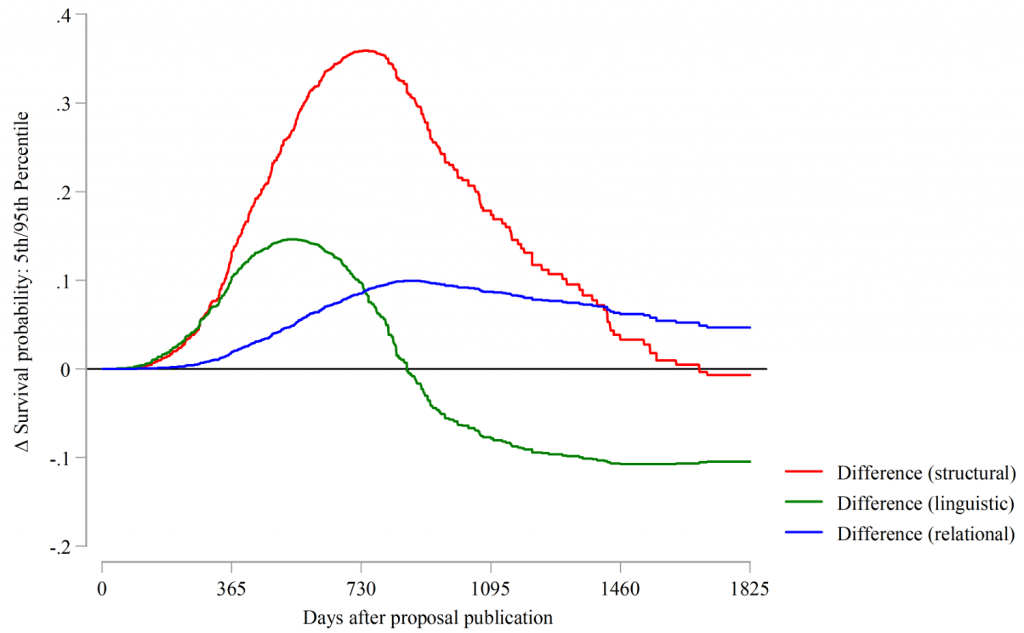
 It is often argued that EU legislation would benefit from becoming simpler. But how does the complexity of a legislative proposal affect the negotiations over whether it enters into EU law? Drawing on a new study, Steffen Hurka and Maximilian Haag explain that different types of policy complexity influence the duration of the decision-making process in the European Union to varying degrees, at different points in time and in some unexpected ways.
It is often argued that EU legislation would benefit from becoming simpler. But how does the complexity of a legislative proposal affect the negotiations over whether it enters into EU law? Drawing on a new study, Steffen Hurka and Maximilian Haag explain that different types of policy complexity influence the duration of the decision-making process in the European Union to varying degrees, at different points in time and in some unexpected ways.
“I wish that the superfluous and tedious statutes were brought into one sum together, and made more plain and short.” – King Edward VI
“It is essential that every single measure in the EU’s rulebook is fit for purpose – modern, effective, proportionate, operational and as simple as possible.” – Frans Timmermans, EU Commissioner for Better Regulation, Interinstitutional Relations, the Rule of Law and the Charter of Fundamental Rights
King Edward VI and Frans Timmermans never met, but their shared concern over excessive policy complexity transcends centuries and vastly different political systems. While the contemporary political successors of King Edward currently try to withdraw from the European Union (EU) in order to “take back control” (Theresa May), the EU increasingly recognises that the complexity of its policies creates enormous challenges for the carrying capacity of its political institutions, underlined by the Commission’s “Better Regulation” agenda.
In a recent study, we assess the extent to which the complexity of the Commission’s policy proposals affects the duration of legislative negotiations under the ordinary legislative procedure. We argue that policy complexity comes in different shapes, which create different types of transaction costs for the political actors involved in the legislative negotiations. All of these transaction costs should contribute to a loss of legislative efficiency.
Structural policy complexity, which can simply be thought of as the size of the policy proposal and is measured by the number of recitals, paragraphs, subparagraphs, points and indents in the proposal, should increase the workload for all policy-makers and multiply opportunities for bargaining, leading to a longer duration of legislative negotiations. The linguistic policy complexity of a Commission proposal, which we quantify as the word entropy of the legal text, should primarily leave its mark on legislative duration by augmenting the cognitive burdens for those involved in the negotiations. Finally, the relational complexity of the Commission proposal, which emerges through the interaction of individual policy elements both within the proposal itself and in relation to other, already existing pieces of EU law, creates higher costs for information acquisition for the political actors involved in the legislative negotiations.
Controlling for a series of relevant institutional and political factors identified in previous studies, we estimated the time it takes the institutions of the EU to finalise the ordinary legislative procedure dependent on different levels of policy complexity. Figure 1 summarises the key findings of our study. The figure displays how the three different types of policy complexity described above affect the estimated time between the publication of a Commission proposal and the publication of the final legal act in the Official Journal of the European Union. Specifically, the lines display the difference between simple and complex proposals (at the 5th and the 95th percentile of the complexity distribution). Accordingly, positive values indicate a procedure-prolonging effect of higher policy complexity, whereas negative values indicate an accelerating effect.
Figure 1: Difference in survival: three types of policy complexity
Note: For more information, see the authors’ accompanying paper in European Union Politics
Our models demonstrate that the relationship between policy complexity and legislative duration is not as straightforward as one might suspect. In particular, the extent to which policy complexity impacts upon legislative duration is strongly determined by how we decide to conceptualise policy complexity. While structural policy complexity (red line) strongly delays the ordinary legislative procedure as expected, its effect peaks after roughly two years and declines thereafter. In contrast, we find that the EU seems to be much better equipped to deal with legally complex proposals (blue line). The effect of our relational policy complexity measure is much smaller and exerts its impact comparably late in the process.
The most intriguing pattern is displayed by linguistic policy complexity (green line), as the estimated effect reverses at some point, implying that after roughly two years, linguistically simple Commission proposals become more difficult to finalise than linguistically complex ones. We found that this puzzling effect can be attributed to the fact that some linguistically simple proposals are highly controversial in political terms. These proposals draw their linguistic simplicity from the fact that they contain many provisions that empower the European Commission to adopt delegated and implementing acts. These proposals contain a lot of repetitive language (e.g. “The Commission shall be empowered to adopt delegated acts…”), which indicates both linguistic simplicity and potential for inter-institutional conflict.
While our study focused on the case of the EU, the question of how policy complexity affects the efficiency of legislative processes is highly relevant for all political systems and for all levels of government. In this context, the crucial question we could not answer is how factors like state capacity or institutional arrangements mediate the effects of policy complexity. In order to answer this question, we need research designs that compare how different political systems process policy proposals of varying complexity.
This could bring us closer to an idea of how political systems must be designed in order to cope efficiently with increasing policy complexity while maintaining their democratic legitimacy. In this context, we find it important to emphasise that policy complexity is not inherently bad, but can also be considered an indicator of (legal, technological, social) progress. However, the EU needs to make sure that its institutional infrastructure can cope with this complexity efficiently and that the complexity of its policy proposals matches the carrying capacity of its political institutions. In this sense, the relationship between policy complexity and legislative efficiency touches upon fundamental aspects of the EU’s democratic legitimacy.
For more information, see the authors’ accompanying paper in European Union Politics
Please read our comments policy before commenting.
Note: This article gives the views of the authors, not the position of EUROPP – European Politics and Policy or the London School of Economics. Featured image credit: Tom Parnell (CC BY-SA 2.0)
_________________________________
 Steffen Hurka – LMU Munich
Steffen Hurka – LMU Munich
Steffen Hurka is a postdoctoral researcher and leader of the Emmy Noether Research Group “EUPLEX – Coping with Policy Complexity in the European Union” at LMU Munich, Germany.
 Maximilian Haag – University of Mannheim
Maximilian Haag – University of Mannheim
Maximilian Haag is an MA candidate at the University of Mannheim and will soon join the EUPLEX project as a doctoral researcher.



